|
Part One
Part Two
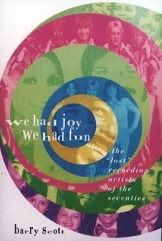
 errestrial radio may be in a crisis. MP3 technology has saturated our
lives, and Satellite radio has begun its quest to do to terrestrial
stations what cable has threatened to network TV. Ironically, the future
of terrestrial radio may lie in its past. What could save radio as a
viable medium is for it to give to its audience what they can’t get
anywhere else: #1 hit music that is likely not to be on your MP3 player,
and the stories and interviews to go with it. That future may be in
programs like Barry Scott’s The Lost 45s. errestrial radio may be in a crisis. MP3 technology has saturated our
lives, and Satellite radio has begun its quest to do to terrestrial
stations what cable has threatened to network TV. Ironically, the future
of terrestrial radio may lie in its past. What could save radio as a
viable medium is for it to give to its audience what they can’t get
anywhere else: #1 hit music that is likely not to be on your MP3 player,
and the stories and interviews to go with it. That future may be in
programs like Barry Scott’s The Lost 45s.
HISTORY OF THE LOST 45s
***
If you happened to have been surfing the radio dial on any Sunday night
in the last twenty years, you’d be likely to come across exactly one
station playing ABBA, KC & The Sunshine Band, or Captain & Tennille.
Although the location on the dial has changed many times, the
distinctive and slightly raspy voice has not. Barry Scott’s
unconventional radio persona has been a staple on the Boston airwaves
since 1981, when he first launched his radio career as a freshman at
Emerson College with a one-hour show called The Gold Rush. You had to
offer something different to get on Emerson College radio in those days,
and no one was playing ‘70s music in the early ‘80s. The most popular
part of the show was a 15-minute closing segment called the Lost 45s,
when Scott would play then-unheard power pop from the early to mid ‘70s,
like The Partridge Family and the Bay City Rollers.
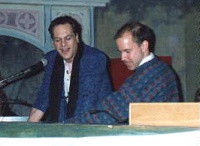 Scott was hired out of college in 1985 as the Promotions & Marketing
Director at WZLX, and was given a one-hour time slot from 11pm to
midnight on Sunday nights for his show. He tried to take the name The
Gold Rush with him, but Emerson said they owned the rights to the name.
Scott instead decided to name his new show The Lost 45s. “They actually
did me a favor,” Scott recalls, “It’s a much better name.” Scott was hired out of college in 1985 as the Promotions & Marketing
Director at WZLX, and was given a one-hour time slot from 11pm to
midnight on Sunday nights for his show. He tried to take the name The
Gold Rush with him, but Emerson said they owned the rights to the name.
Scott instead decided to name his new show The Lost 45s. “They actually
did me a favor,” Scott recalls, “It’s a much better name.”
The station received such a great response about the show in the first
few weeks that ZLX offered to expand the show to 7pm to midnight. “It’s
actually been the requirement now when I move,” says Scott, offering
that this may be part of the show’s continued success through all the
moves. “When people develop a habit, they tend to stick with the habit.”
The strategy worked, and Scott has managed to keep his show on the air
for decade upon decade, consistently achieving the number one rating in
its Sunday night time slot.
In 1992 Scott was let go from WZLX, and within a week was at WBOS. But
that too was only for a time. “I always run into problems with this
show, it’s just so different, and there’s no room for different in
radio,” says Scott. Once again Scott found a new home for the show
within a week, this time at MIX 98.5, where he met Vice President of
Programming Greg Strassell. “I’m fortunate that I have an enlightened
program guy,” says Scott. Strassell has helped to make sure that The
Lost 45s has consistently had a home in the years since, and the two
have worked together at both 93.7 and at Oldies 103.3, where the show
has remained for the past four years. At each station the show has
immediately climbed to number one in its time slot.
THE ROTATION
***
So how does Scott decide what to play and what to leave lost? “I don’t
decide,” says Scott. “The listeners decide.” The show is all-request,
but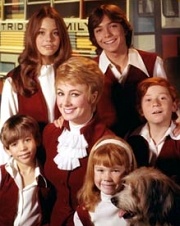 Scott admits he has pushed his favorites until the audience begins
to request them. He defines a “Lost 45” as a Top 40 song “that doesn’t
get airplay regularly on any other station in town.” Tracks could be
from as early as 1965 and as late as 1984, as long as the song is not
“too techno.” As a result, the catalogue from which the show’s songs are
drawn is enormous. There are over 300 songs a year that hit the Top
Forty, and the show covers almost twenty years of music. That means that
on any given Sunday, a listener could hear one of over 7000 songs. Scott admits he has pushed his favorites until the audience begins
to request them. He defines a “Lost 45” as a Top 40 song “that doesn’t
get airplay regularly on any other station in town.” Tracks could be
from as early as 1965 and as late as 1984, as long as the song is not
“too techno.” As a result, the catalogue from which the show’s songs are
drawn is enormous. There are over 300 songs a year that hit the Top
Forty, and the show covers almost twenty years of music. That means that
on any given Sunday, a listener could hear one of over 7000 songs.
The most requested style is what Scott calls early “power pop,” songs
from Tony Orlando & Dawn, the Osmonds or Rick Springfield. But besides
this foundation, the show continues to be inspired by a broad range of
influences. “On radio in the seventies, you could go from Barry Manilow
to Kiss to a disco song, to Parliament Funkadelic, to John Denver. And
that’s what I do, because that’s the way it used to be.”
THE COLLECTION
***
With between seven and eight thousand songs in the playlist, the Lost
45s boasts the nation’s largest on-air music collection. The collection
itself is owned by Scott personally, and the CDs and vinyl records from
which the collection is drawn take up an entire room in his home. “It’s
been a passion for years,” says Scott. He first started buying vinyl
albums as a kid, and his collection soon grew to impressive proportions.
In the ‘80s when CDs first appeared, Scott realized that he was going to
have to repurchase all of the music he had previously bought on vinyl, a
process which is now nearly complete. There are about 200 songs left in
his collection that aren’t on CD, and
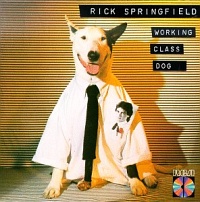 almost all of these are because
these songs simply can’t be found on CD. “There’s a reason why most of
these songs that are left aren’t on CD anymore,” Scott explains. Many of
these songs have not been released digitally due to legal or copyright
disputes, ownership disputes, or in some cases they owners themselves
have chosen to block their re-release. almost all of these are because
these songs simply can’t be found on CD. “There’s a reason why most of
these songs that are left aren’t on CD anymore,” Scott explains. Many of
these songs have not been released digitally due to legal or copyright
disputes, ownership disputes, or in some cases they owners themselves
have chosen to block their re-release.
Scott says he can’t begin to estimate how much money he may have spent
on his collection over the years, but he is pretty sure he isn’t missing
anything that hit the Top 40 from during the years the show covers. As a
student at Emerson, Scott would hit the used record stores in Boston and
Cambridge and buy every rare pop album he could find, but those days are
gone. These days, he finds most of his music through Amazon, EBay or
Google.
But now a new quest has begun, which is getting all of The Lost 45s
library backed up to hard drives, in a common uncompressed file format
called WAV. Most songs have also been converted to the popular MP3
format as well. For the show, Scott usually brings in his CDs.
“Eventually the vinyl will get stored,” Scott says, “but I’ll never
throw them away.”
THE INTERVIEWS
***
But the Lost 45s is more than just a series of once-forgotten and great
songs. Much of what keeps fans coming back to the show are the facts and
stories around those songs,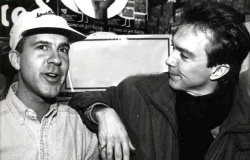 which Scott pulls together from research and
from interviews with the artists themselves. which Scott pulls together from research and
from interviews with the artists themselves.
Scott has interviewed over 350 people, even releasing a book about the
first sixty. To make the interviews interesting for both himself and the
listeners, he rarely takes a conventional approach. “I try not to ask
the same questions as everybody else,” says Scott. “When I interviewed
Carly Simon, I said, I’m not going to ask you that question everybody
asks about ‘You’re So Vain,” but I do want to know what it was like
singing with James. Normally she doesn’t talk about James Taylor, but
she told me all about it. Sometimes it’s just the way you phrase it.”
The most fun interviews are with the artists who speak their minds.
“Cher was fun, Olivia Newton John was fun,” Scott recalls. “But Debbie
Harry of Blondie was real fun. She just said whatever was on her mind.
If she hated a question, she’d tell me to fuck off. It was great.”
To prepare for interviews, and to fill the show with the facts and
stories for fans, Scott turns to dozens of books on the history of Rock
n’ Roll, including those from Billboard, Rolling Stone and Casey Kasem.
But Scott has learned that these books don’t always have their facts
straight.
One extreme example was the story of George McCrae, who had a number one
song in 1975 with Rock Your Baby. “Billboard had said he died in 1989.
And I found him, called him, and talked to him. I told him, ‘hey,
Billboard has you listed as dead.’” Turned out that George did know
about the mistake. It was actually Gordon McCrae, a Broadway star who
had died. “He said he spent about two years fighting them to say he was
alive.”
NEXT SECTION
Part One
Part Two
|